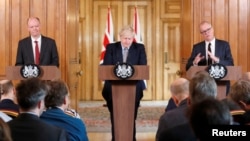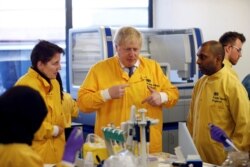British officials are trying to ready the country for a “more widespread transmission” of coronavirus and have warned that in the event of a major spread cities could be locked down and public transport suspended.
But they are being buffeted by a headwind of criticism — either being blamed for sowing the seeds of panic, or for not acting more decisively to try stem the virus from reaching Britain in the first place. Some critics question why the example of Italy was not copied and flights from China were not banned earlier.
Others suggest the government has been laggardly in cutting flights to and from Italy — a move London is still reluctant to do, in contrast to British-based airlines, which have announced a drastic reduction in the number of flights. |
If police lose “significant staff” numbers to illness, they would “concentrate on responding to serious crimes and maintaining public order,” according to a government battle plan unveiled by Prime Minister Boris Johnson Tuesday. And if coronavirus becomes established, there will be a focus on essential services and helping those “most at risk to access the right treatment.” The armed forces will provide support as needed.
Containing threat, and panic
The country early Tuesday had a total of 40 confirmed cases, a fraction of the numbers in Italy, Europe’s coronavirus epicenter. But with some cases in Britain now not linked to travel to China or to north Italy, fears are mounting of so-called “community transmission,” or infection by people in their own city or neighborhood rather than by those coming from outside.
After chairing Monday a COBRA cross-department meeting about COVID-19, Prime Minister Boris Johnson warned the outbreak is “likely" to become “more significant” across Britain in the coming days and weeks. “We've agreed a plan so that if and when it starts to spread, as I'm afraid it looks likely it will, we are in a position to take the steps that will be necessary," he said.
Johnson has, though, sought to allay public fears, adding that Britons should “go about business as usual” for the time being and assuring them the health and emergency services are “very, very well-prepared.” But as Italian politicians are discovering, there is a dilemma in trying to contain the virus as well as lay the groundwork for coping with broader contagion, while at the same time avoiding sparking further public alarm.
Government officials say privately it could be months and not just weeks before the outbreak in Britain peaks, presenting another conundrum: how to balance what needs to be done to curb the outbreak while inflicting as little as damage as possible on an economy that is already trying to brace for the possible consequences of Brexit?
The World Health Organization, WHO, is warning that the “window of opportunity” to contain the virus is “narrowing” and officials say that while many observers are focused on Italy, which has taken the most decisive action of any European country so far, there will be more shocks in store elsewhere on the continent. Almost nine times as many coronavirus cases were reported outside China as inside in the previous 24 hours, they say.
The risk posed by coronavirus in the European Union was raised to its second highest level Monday.
Phased response
The focus in Britain is still on containment, but the government is planning different phases of reaction and response in line with a strategy of “contain, delay, research and mitigate” the threat. The main aim is to avoid major spikes of patients that could overwhelm the country’s health services.
In case it cannot, the government is planning to return retired doctors and nurses to work. A wider spread, depending on its reach and severity, will trigger, ministers have said publicly, more urgent and drastic responses.
New emergency plans are being prepared to give schools and local authorities’ powers to suspend laws to cope with a pandemic. Businesses will be told to encourage employees to work from home. Whole cities could be shuttered, large gatherings banned and public transport suspended, if needed.
“Under the worst case scenario we would have to take some quite significant actions that would have social and economic disruption,” the country’s health secretary, Matt Hancock, told the BBC. “It may be necessary to close some schools and other population distancing measures,” he added.
Asked if the government might follow the Chinese and Italian strategy of isolating individual cities and towns with large outbreaks, he said: “There’s clearly a huge economic and social downside to that but we don’t take anything off the table at this stage because you have got to make sure you have all the tools available if necessary.”
France announced Sunday a ban on public gatherings of more than 5,000 people.
A team of scientists and media consultants is also to be set up to handle a public information campaign — with posters and social media ads telling people to wash their hands and other steps to take to reduce their risk of contracting the virus.







